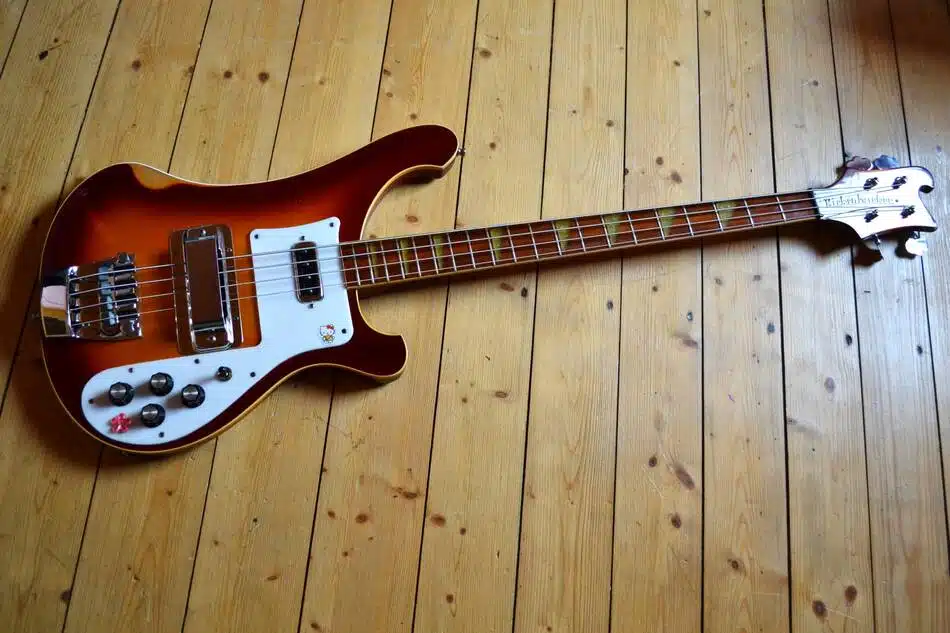
Rickenbacker has been in existence since 1931, and is, undoubtedly, one of the most sought after bass and guitar brands out there. However, one thing that makes so many bass players hate Rickenbacker bass guitars are their price. But why are Rickenbacker bass so expensive?
The main reason why Rickenbacker bass guitars are so expensive is that there is more demand for Rickenbacker bass than the supply. And this is an intentional strategy by the company to increase the value of their bass by limiting production. Also, Rickenbacker bass is handmade in the USA by expert craftsmen. This means the production cost is high.
Let’s take a look at all of the factors that make Rickenbacker bass guitars so expensive. I was kinda fascinated by the story, and I’m sure you will too. After that, we’ll talk about how much it will cost you to own a Rickenbacker bass and whether or not it is worth spending that much on a bass guitar. Let’s get into it.
Reasons Why Rickenbacker Bass are so Expensive
Here are four reasons why Rickenbacker bass guitars have such a high price tag
Rickenbacker bass are exclusively handmade in the USA
Many bass and guitar brands have factories outside of the United States. A brand like Fender, although, has a factory in the USA, makes most of its guitars in Mexico, China, and Japan. Many other brands manufacture their guitars and basses in Indonesia and Korea as well. I explained this, in detail, in my article on why guitars are made in Mexico.
The primary reason why many guitar brands manufacture their guitars outside of the United States is that the cost of production is much cheaper compared to guitars made in the USA. That’s because the standard of living of guitar craftsmen in these countries is quite low.
For this reason, many brands are able to mass-produce their bass guitars in these countries at a relatively lower price.
Even for many Made in America bass guitars, some of the bass guitar’s parts are outsourced to third-world countries in an effort to reduce cost. It’s quite a common practice for guitar brands to outsource their bass pickups, tuners, or perhaps the bridge to another company. And usually, this is done to save some production cost.
However, this is not the case for Rickenbacker bass and guitars. Ever since the company started, all Rickenbacker bass guitars are made in the United States. All of the parts used in making Rickenbacker bass are made in-house in their factory located in Santa Ana, California. Rickenbacker does not outsource any part of their bass guitar production to any company.
And because Rickenbacker bass is made in the USA, the production cost is high. The labor cost of guitar craftsmen in the USA is much higher than that of countries like Mexico, Indonesia, China, and Japan.
Another reason why the production cost of Rickenbacker bass is high is that they are handmade by expert craftsmen with years of experience. Although some of the guitar making process at the Rickenbacker factory involves using machines and automation devices such as the CNC machine, at the finishing stage, everything is made by hand.
All of the sanding of the wood, shaping, coatings, and polishing of the guitars, and many nuances that gives Rickenbacker bass its unique look and sound is made by hand
This means more hours are put into making each and every guitar. Hence, the workers need to be paid for the hours they spend making each guitar.
In essence, the higher cost of production of Rickenbacker bass is part of the reasons why they are expensive.
Rickenbacker bass guitars have an excellent build quality.
Another reason why Rickenbacker bass is expensive and highly sought after is that they have excellent build quality.
As I mentioned earlier, all of the different components and parts used in making Rickenbacker bass and guitars are all manufactured in the USA, in their own factory.
A lot of the guitar circuitry in many other guitars besides Rickenbacker are made in Asia or Mexico, wired as assemblies, and imported in the USA. Usually, the pickups are the most imported guitar parts by other brands.
Rickenbacker makes all of those parts themselves and tries their best to use American-made components where possible. The only part of Rickenbacker guitars that are outsourced is the CTS pots. They are custom-made pots exclusively for Rickenbacker products and are made in Taiwan. Everything else is made in their factory.
Rickenbacker bass has a unique sound that cannot be emulated.
The process of making guitars at Rickenbacker is quite different from many other brands. The circuitry is built differently; the shape of the bass and the pickups are all different from many other pickups out there.
For this reason, Rickenbacker bass sounds unique, and no other bass can emulate that sound. This means if you want the Rickenbacker bass sound, you need to buy a Rickenbacker bass.
This is not the case for other name brands like Fender or Ibanez. There are many cheaper bass guitars that can be tweaked to sound like Fender, Ibanez, or Music Man bass guitars. It can be challenging but quite possible. But this is not the case for Rickenbacker bass.
Another unique thing about Rickenbacker bass that gives them their unique sound is that they have a stereo output. The neck and bridge pickups have their own mono outputs. This means you can play the Rickenbacker through two different bass amps and tweak the sound however you want.
All of these features about the Rickenbacker bass are what contribute to its uniqueness. And if you need that sound, you have no option than to spend a lot of money buying a Rickenbacker bass.
The demand for Rickenbacker bass exceeds its supply.
Over the years, the Rickenbacker bass has been used by many bass players. However, Rickenbacker bass was made popular by these three iconic artists and bass players: Paul McCartney, Geddy Lee of Rush, and Chris Squire.
And over the years, bass players got interested in Rickenbacker bass guitars. Initially, Rickenbacker bass was priced similar to other Made in America like Fender and Music Man bass guitars, and many bass players could afford it.
That was until the early ‘90s, when John C. Hall, Rickenbacker’s CEO, helped change the company’s marketing strategy. And obviously, it worked in their favor.
Rickenbacker reduced their production. They began producing fewer and fewer guitars and bass every year. So Rickenbacker bass and guitars became rare as their demand kept going up. And the price of Rickenbacker bass kept increasing as demand increased. So if you needed a Rickenbacker bass or guitar, you had to pay a premium.
This kept going, and people started viewing Rickenbacker more as a luxury guitar brand than just a musical instrument.
Now they are able to charge huge amounts for their bass and guitars, and absolutely nothing has changed about their production. They still produce the same model of guitars with no upgrades to their design or components.
How much does a Rickenbacker bass cost?
Brand new Rickenbacker bass guitars cost between $1800 – $2200. That is the price range of Rickenbacker 4003 bass guitars, which are still in production. However, you can find used options at a relatively lower price.
Currently, Rickenbacker is only producing their 4003 line of bass guitars, specifically the 4003S and 4003W. So, if you are looking for a brand new Rickenbacker bass, those are the two options you’ve got. And you can get them for $1800 – $2200, depending on the color and the dealership you are buying them from.
You can buy used Rickenbacker 4003 bass guitars at a lower price. But those deals are usually hard to find. You may have to browse through eBay, Reverb, or Craigslist to find someone selling theirs at a low price.
Vintage Rickenbacker bass guitars that are not produced by the company anymore can be quite expensive, even when you buy them used. That’s because Rickenbacker bass guitars appreciate in value.
So all of the 3001 and 4001 series Rickenbacker bass guitars made in the late ‘60s and early ‘70s will cost you quite a lot.
Are Rickenbacker bass worth the money?
Although Rickenbacker basses are expensive, if you love its unique signature sound, the brand, the overall build quality, and design, then Rickenbacker bass is worth it. However, for most bass players, Rickenbacker bass is definitely not worth the high price.
Whether or not Rickenbacker bass is worth it is really a matter of personal preference. There are some bass players who I like to call Rickenbacker fanboys.
This category of bass players loves everything about the Rickenbacker bass. Its design, neck, build quality, and unique midrange sound. And they also Rick bass guitars are the best bass guitars ever made.
This category of bass players wouldn’t trade their Rickenbacker bass for anything. And they wouldn’t hesitate to spend their cash on another Rickenbacker bass model if they can afford it.
And then there is another category of bass players who are the opposite of Rickenbacker fanboys. These players think Rickenbacker bass guitars are overpriced pieces of musical instruments that offer no value. These people think the Rickenbacker bass guitar’s design is ugly, and it doesn’t sound anything like a bass guitar.
This category of bass players also thinks Rickenbacker is an arrogant company and wants nothing to do with them.
Besides all of the love-hate relationship bass players have with Rickenbacker bass guitars, here is what I’ll say.
If you love everything about the Rickenbacker bass and can afford to buy it without any issues, you should definitely go for it.
Also, if you are a professional bass player, especially session musicians, it’s worth investing in a Rickenbacker bass if you can afford it. That’s because the Rickenbacker bass tone might be the option for a particular song compared to other bass guitars.
However, for most bass players, it’s simply not worth investing that amount of money in a Rickenbacker bass. For one, you might not get a return on investment. And also, there are many decent bass guitars out there. You can buy two excellent sounding professional basses for the price of a single Rickenbacker bass.

Hi, I’m Raymond. A keyboard player, music producer, and writer. And I’m also the founder of this blog. As someone who has been working with several audio and music equipment and different musicians for many years, my goal is to answer all your questions on music and equipment, as well as the latest music software and technology. For more info, check out my about me page
